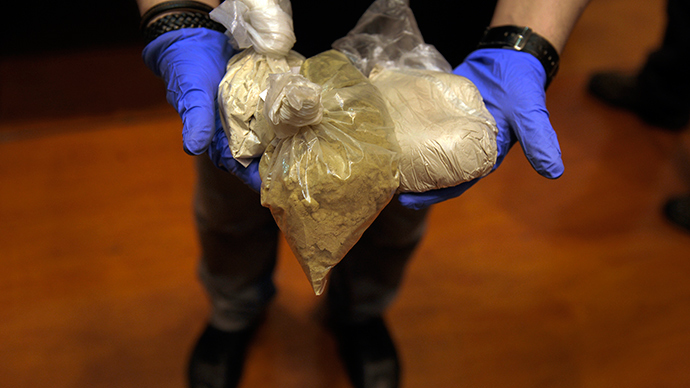‘Give addicts free heroin’: Police chief urges drugs policy shakeup

A senior British police officer says heroin addicts should be given the Class A substance for free and be professionally supervised to aid their rehabilitation.
Mike Barton, chief constable of Durham police force, said police could not continue arresting addicts, and that they would be better off providing clean heroin to addicts in a controlled environment.
In a blog for the Huffington Post, Barton said police also needed to target drug dealers rather than those addicted to dangerous substances.
“Their entrapment in criminal justice is a waste of police time and the state’s money and dissuades addicts from revealing themselves for treatment for fear of criminal consequences,” he wrote.
Barton also criticized existing methods of rehabilitating heroin addicts using a chemically similar supplement called methadone.
READ MORE:Heroin addicts to be given free foil on the state
“In 34 years I have seen many people being ‘parked’ on methadone programs. None of them, in my opinion, have been healthy,” he writes.
“There are 1,700 registered heroin addicts in Durham and Darlington and a significant proportion of them who are on methadone programs engage in what the medical profession euphemistically call ‘topping up.’
“This means they are still taking street heroin as well as methadone – surely a dangerous cocktail. If addicted people presenting for treatment are likely to ‘top up’ then why not provide them with heroin rather than methadone?”
Additionally, Barton argued that under existing policies, drug addicts were more likely to be infected with dangerous diseases such as hepatitis or HIV. He claimed treatment for each addict could cost the National Health Service (NHS) up to £80,000 per year.
Suggesting possible solutions to improve treatment of addicts, Barton proposed using ‘consumption rooms’ similar to those in Denmark.
“Consumption rooms have proven to improve the health of addicts. Having seen the Copenhagen example, I would not support any consumption room where addicts still source their drugs from criminals,” he writes.
“In effect we are providing a ready market for organized
crime to run their drugs business. Consumption rooms are
effective if there is a significant street consumption problem (a
problem I have not personally witnessed in the UK, and certainly
not a problem in my force area), but in my view the drugs must
not be sourced from criminals and addicts using the facility must
be encouraged to engage in recovery.”
READ MORE:Babies of drug addicts show developmental problems –
study
Barton’s warnings have been voiced in the past, with numerous experts saying clean heroin was a better alternative than chemically contaminated substances usually sold on the streets.
Additionally in 2010, UK police had considered providing ‘harm reduction kits’ to heroin addicts, which would include clean needles, a clinical waste container and information on how to inject heroin into the body properly.
However, the scheme was quickly scrapped following outrage from politicians and senior officers over facilitating addicts taking Class A substances.












